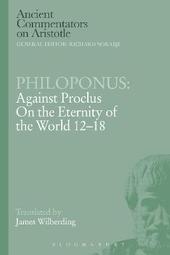
|
Philoponus: Against Proclus on the Eternity of the World 12-18
Paperback / softback
Main Details
| Title |
Philoponus: Against Proclus on the Eternity of the World 12-18
|
| Authors and Contributors |
By (author) Philoponus
|
|
Translated by James Wilberding
|
| Series | Ancient Commentators on Aristotle |
|---|
| Physical Properties |
| Format:Paperback / softback | | Pages:240 | | Dimensions(mm): Height 234,Width 156 |
|
| Category/Genre | Western philosophy - Ancient to c 500 |
|---|
| ISBN/Barcode |
9781472557704
|
| Classifications | Dewey:185 |
|---|
| Audience | | Postgraduate, Research & Scholarly | | Undergraduate | |
|---|
|
Publishing Details |
| Publisher |
Bloomsbury Publishing PLC
|
| Imprint |
Bloomsbury Academic
|
| Publication Date |
10 April 2014 |
| Publication Country |
United Kingdom
|
Description
In chapters 12-18 of Against Proclus, Philoponus continues to do battle against Proclus' arguments for the beginninglessness and everlastingness of the ordered universe. In this final section there are three notable issues under discussion. The first concerns the composition of the heavens and its manner of movement. Philoponus argues against the Aristotelian thesis that there is a fifth heavenly body that has a natural circular motion. He concludes that even though the celestial region is composed of fire and the other three elements, it can move in a circle by the agency of its soul, and that this circular motion is not compromised in any way by the innate natural motion of the fire.Chapter 16 contains an extended discussion of the will of God and His relation to particulars. Here Philoponus addresses issues that become central to medieval philosophical and theological discussions, including the unity, timelessness and indivisibility of God's will. Finally, throughout these seven chapters Philoponus is engaged in a detailed exegesis of Plato's Timaeus which aims to settle a number of familiar interpretive problems, notably how we should understand the pre-cosmic state of disorderly motion, and the statement that the visible cosmos is an image of the paradigm. Philoponus' exegetical concerns culminate in chapter 18 with an extensive discussion of Plato's attitude to poetry and myth.
Author Biography
James Wilberding is Assistant Professor of Philosophy, Williams College, Massachusetts
|